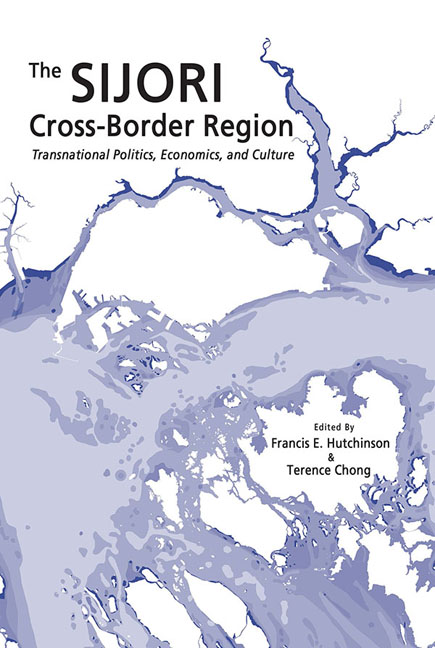Book contents
- Frontmatter
- Contents
- List of Maps
- List of Tables
- List of Figures
- Foreword
- Acknowledgements
- Contributors
- Abbreviations
- Introduction
- Section I Understanding the Whole
- Section II Policy and Politics
- Section III Cross-Border Social and Cultural Communities
- Map4
- 9 The Significance of Riau in SIJORI
- 10 Singaporeans Living in Johor and Batam: Next-Door Transnationalism Living and Border Anxiety
- 11 Singapore Malay Family Businesses: Negotiating Malaysian and Singapore Citizenship and National Identities
- 12 Imaginary Frontiers and Deferred Masculinity: Singapore Working-Class Men in Batam
- Section IV Formal and Informal Economies
- Conclusion
- Appendix
- Sources for the SIJORI Maps
- Index
12 - Imaginary Frontiers and Deferred Masculinity: Singapore Working-Class Men in Batam
from Section III - Cross-Border Social and Cultural Communities
Published online by Cambridge University Press: 22 July 2017
- Frontmatter
- Contents
- List of Maps
- List of Tables
- List of Figures
- Foreword
- Acknowledgements
- Contributors
- Abbreviations
- Introduction
- Section I Understanding the Whole
- Section II Policy and Politics
- Section III Cross-Border Social and Cultural Communities
- Map4
- 9 The Significance of Riau in SIJORI
- 10 Singaporeans Living in Johor and Batam: Next-Door Transnationalism Living and Border Anxiety
- 11 Singapore Malay Family Businesses: Negotiating Malaysian and Singapore Citizenship and National Identities
- 12 Imaginary Frontiers and Deferred Masculinity: Singapore Working-Class Men in Batam
- Section IV Formal and Informal Economies
- Conclusion
- Appendix
- Sources for the SIJORI Maps
- Index
Summary
INTRODUCTION
This chapter looks at Singaporean working-class men who travel to the Indonesian island of Batam for cheap sex, food and shopping. It presents Batam as a space particular to the metropolis-hinterland relationship that Singapore shares with the Riau islands. Such a space is conceived as an “imaginary frontier” where the hinterland is imagined by the metropolis as a peripheral site that accommodates its desires and is, consequently, malleable to the economic, emotional and sexual needs of men who go there to find what they cannot obtain in the metropolis. Like all frontiers, Batam also sees an asymmetrical power relationship between the visitors and inhabitants of this space, thus allowing for the romanticization and eroticization of the Indonesian island. The chapter attempts to tease out distinctions between Batam and other domestic red-light districts to uncover the socio-cultural contours of the men who visit the Indonesian island. It proceeds to examine activities such as friendships and gift-giving from male clients to Indonesian sex workers, together with the treating of the latter with food and drinks, as meaningful actions that suggest the need to rethink the trans-border nature of masculinity. It is argued that the diminished economic status of Singapore working-class men compels them to “defer” their masculinity from the metropolis to the Riau island hinterlands, and that sexual consumption must thus be analysed as but one of an array of meaningmaking activities performed by working-class Singaporean men as they perform their masculinity.
THE METROPOLITAN SPILLOVER EFFECT
The emergence of so-called “growth triangles” from the late 1980s is a fertile space to examine the global dimension of masculinity. Global forces like imperialism, labour migration, neo-colonialism and globalization have connected and animated a multiplicity of local gender orders (Connell 2005), while constructs of masculinity in global institutions “are rapidly becoming the dominant global hegemonic model of masculinity, against which all local, regional, and national masculinities are played out and to which they increasingly refer” (Kimmel 2005, p. 415; see also Cashmore and Parker 2003; Kubrin 2005). Scholars have argued that the globalization of masculinity should not lead to the intellectual fossilizing of global masculinities. For example, the notion of a global masculinity is almost invariably a Western construct without due consideration to the cultural hybridization processes that go into the formations of such global masculinities (Kam 2003).
- Type
- Chapter
- Information
- The SIJORI Cross-Border RegionTransnational Politics, Economics, and Culture, pp. 310 - 328Publisher: ISEAS–Yusof Ishak InstitutePrint publication year: 2016

